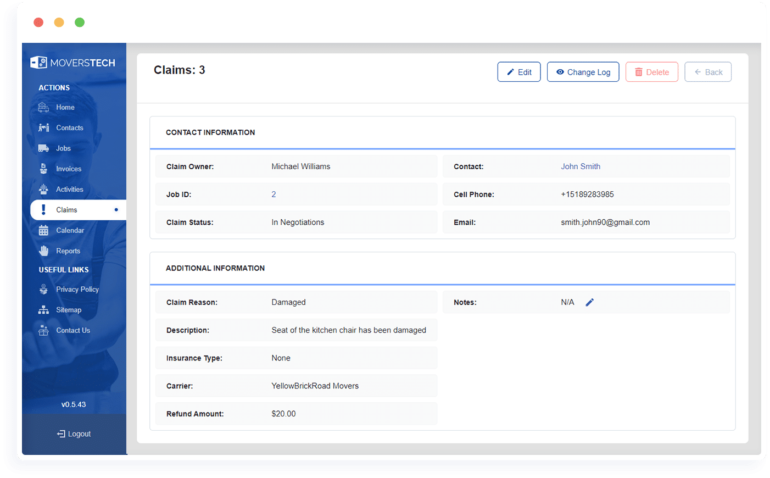In the moving industry, claims arise when services don’t meet expectations or damages occur. For many, the psychological impact of moving claims can be stressful. These claims often signal unexpected mistakes, increasing stress during an already taxing process. Understanding these claims is crucial if you’re in charge of operations or are a frontline staff member. You can handle these challenges efficiently with the right tools, like the MoversTech CRM. Doing so will reduce the strain on your clients and strengthen your company’s reputation.
Psychological impact of moving claims on customers
As a moving professional, recognizing these psychological impacts is crucial for you. It’s not just about the physical move; it’s about the emotional value your clients show. Understanding and addressing these feelings allows you to improve your claims handling process, ensuring a smoother transition for your clients and building lasting trust.
Loss and grief
- Possessions aren’t just objects; they hold memories.
- Damage or loss can trigger intense feelings, especially for items with sentimental value.
- For many, it’s like losing a piece of their history.
Understanding the emotional connection clients have with their items will assist you in providing adequate support to the client.
Stress and anxiety
- Claims processes aren’t just logistical stress; they’re also emotional stress.
- Dealing with procedures intensifies the stress.
- The potential financial loss adds another source of anxiety.
These procedures as just as stressful to the client as they are to you; keep that in mind when working with them to resolve the claim.
Distrust
- One negative experience can shape a customer’s perception.
- Past challenges lead to doubting moving companies.
- Building trust is more than resolving a claim; it’s about understanding the emotional toll.
Recency bias can have a significant effect on people. Try your best to state your credibility and convince your client that they should trust you.

Psychological impact on moving companies
Understanding these psychological effects is very important if you’re in the moving sector. Addressing these concerns head-on improves customer relations, a motivated team, and a strong budget. Staying aware of these psychological impacts ensures you recognize them when they appear and know how to avoid them.
Reputation anxiety
- Negative reviews sting. They deter potential customers.
- Word of mouth remains powerful in influencing choices.
- A single unresolved claim can severely harm future business prospects.
You understand that in today’s digital age, your reputation is what speaks the loudest. One unresolved claim can drive away potential clients. Protecting your reputation is not only about avoiding risks but also about proactive customer service.
Employee morale
- Facing dissatisfied customers daily takes a toll.
- The continuous stress of claim resolution impacts employee well-being
- Over time, these pressures can hinder performance
Your team is your greatest asset. When they’re overwhelmed with claims, their morale can be significantly reduced. Offering them support and training can be invaluable and positively affect their morale.
Financial stress
- Large or frequent claims strain a company’s finances
- Every unresolved claim eats into profit margins
- For a thriving business, managing these financial setbacks is important.
A moving company, like any business, needs stability. Addressing and minimizing claims can offer that much-needed financial peace, allowing for the financial growth of the business.

Distrust
- Past unresolved claims foster skepticism
- Negative experiences paint a broad brush, casting doubt on the moving industry.
One negative experience can make your clients doubt you in the future. Address these claims promptly and efficiently, and you can rebuild trust and show customers your commitment.
Building trust amidst the chaos
Building trust amidst the chaos of claims requires open communication, empathy, and transparency. Follow these principles, and your approach will build positive client relations and strengthen your company’s reputation.
Open communication
- Keep customers in the loop.
- Inform them regularly about the status of their claim.
- Set and manage expectations from the outset.
When problems arise, open communication is a lifeline. It’s essential to update customers frequently. Doing so reassures them and instills trust, even in challenging situations.
Empathy
- Train staff to understand and empathize.
- Equip them with skills to handle emotional clients.
- Stress the importance of a compassionate approach.
Claims often come with heightened emotions. By approaching them with empathy, you can transform a potentially negative encounter into a trust-building moment.
Transparency
- Clearly outline claim processes.
- Be upfront about potential wait times.
- Communicate the possible outcomes from the start.
Transparency is your ally. You should let customers know how their claims will be handled. Offering clarity can alleviate some of their stress. Moreover, by setting the stage early, you prevent unwelcome surprises.
Strategies for dealing with stressful claims
Facing claims is an inevitable part of the moving industry. However, with the right strategies and tools, you can turn these challenges into opportunities for growth and customer satisfaction. Always prioritize effective communication and keep in mind that an informed team is an empowered one.
Effective training
- Strengthen your team with skills and know-how.
- Invest in training to handle the psychological impact of moving claims effortlessly.
Equipping your staff with the right skills makes them confident in dealing with challenges. Using proven strategies to handle moving claims ensures smooth solutions and satisfied clients.

Organized claims processes
- Implement modern technologies.
- Opt for methods that accelerate claims.
- Aim to group customer claims for efficiency.
An easy and swift claims process can significantly reduce stress. Modern solutions can help simplify operations, ensuring clients feel valued and heard.
Feedback loops
- Engage both clients and employees.
- Understand the importance of follow-ups in moving.
- Refine your process based on feedback.
Feedback isn’t just about gathering information. It’s an opportunity to improve on more levels than one. Regular interactions with clients and employees provide insights, allowing you to enhance your claims process with each interaction.
Trust in the process
Trust is the foundation of any successful claims process, minimizing the psychological impact of moving claims. A well-structured process not only simplifies operations but also reduces customer stress. Our CRM brings advanced features designed specifically to help with this task. Testing out its potential can redefine your claims experience. Explore our CRM’s capabilities and let it be the change agent in your claims management.

